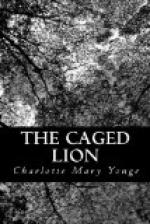‘It was the less wonder,’ said James, still coldly, ’that they should have thought themselves betrayed, since their king believed it of me.’
’Nay, ’twas but for a hot moment—ay, and the bitterest I ever spent. What could I do when the villains swore that there were signals and I know not what devices passing? I hoped yet ’twas but a plea for their own cowardice, and was mounting to come and see for you. Come, I should have known you better; I’d rather the whole world deceived me than have distrusted you, Jamie.’
There was that in his tone which ended all resentment, and James’s hand was at once clasped in his, while Henry added, ’Ho, Provost-marshal! to the gallows with these knaves!’
‘Nay, Harry,’ said James, ’let me plead for them. There was more than ordinary to dismay them.’
’Dismay! ay, the more cause they should have stood like honest men. If a rogue be not to hang for deserting his captain and then maligning him, soon would knavery be master of all.’
‘Hear me first, Hal.’
’I’ll hear when I return and you are dried. Why, man, thou art an icicle errant; change thy garments while I go round the posts, or I shall hear nought for the chattering of thy teeth.’
’Nor I for your cough, if you go, Harry. Surely, ’tis Salisbury’s night!’
’The more cause that I be on the alert! Could I be everywhere, mayhap a few winter blasts would not have chilled and frozen all the manhood out of the host.’
He spoke very sharply as he threw him on his horse, and wrapped his cloak about him—a poor defence, spite of the ermine lining, against the frost of the December night for a man whose mother, the fair and wise Mary de Bohun, had died in early youth from disease of the lungs.
James and the two young partners of his adventure had long been clad in their gowns of peace, and seated by the fire in the refectory, James with his harp in his hand, from time to time dreamily calling forth a few plaintive notes, such as he said always rang in his ears after hearing a Scottish voice, when they again heard Henry’s voice in hot displeasure with the provost-marshal for having deferred the execution of the runaways till after the hearing of the story of the King of Scots.
‘His commands were not to be transgressed for the king of anything,’ and he only reprieved the wretches till morning that their fate might be more signal. He spoke with the peremptory fierceness that had of late almost obscured his natural good-humour and kindliness; and when he entered the refectory and threw himself into a chair by the fire, he looked wearied out in body and mind, shivered and coughed, and said with unwonted depression that the sullen fellows would make a quagmire of their camp after all, since a French reinforcement had come up, and the vigilance that would be needed would occupy the whole army. At supper he ate little and spoke less; and when James would have related his encounter within the Scots, he cut him short, saying, ’Let that rest till morning; I am sick of hearing of it! An air upon thy harp would be more to the purpose.’




